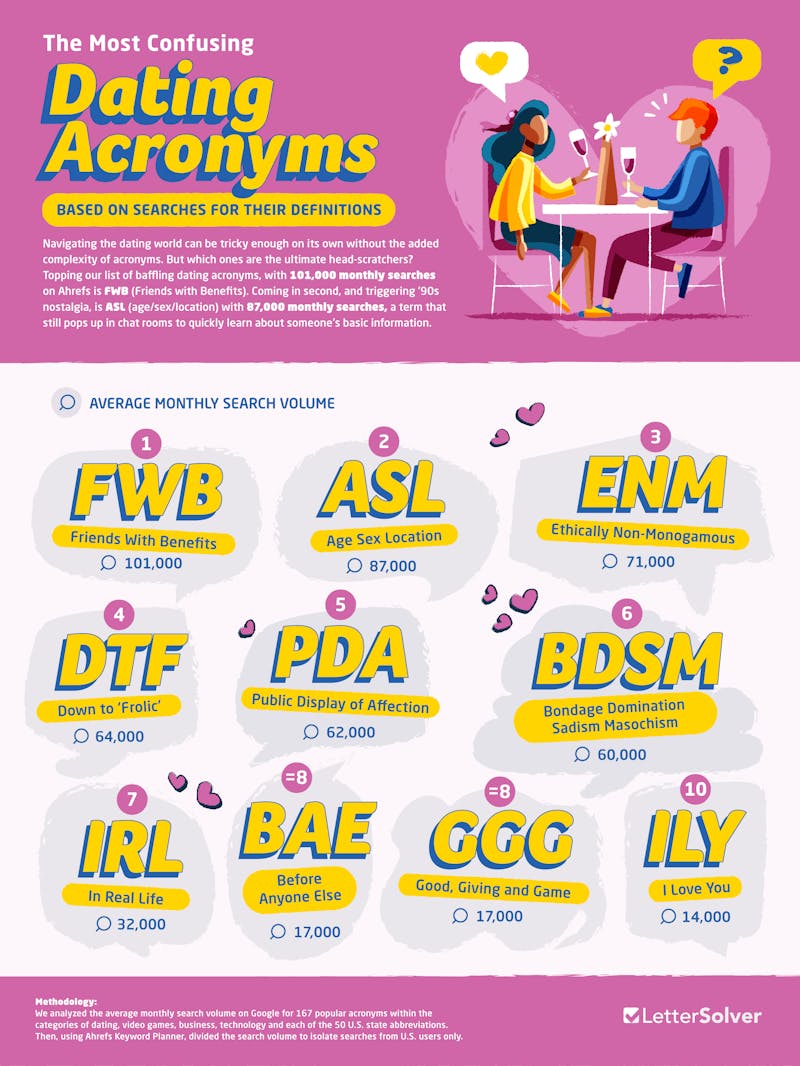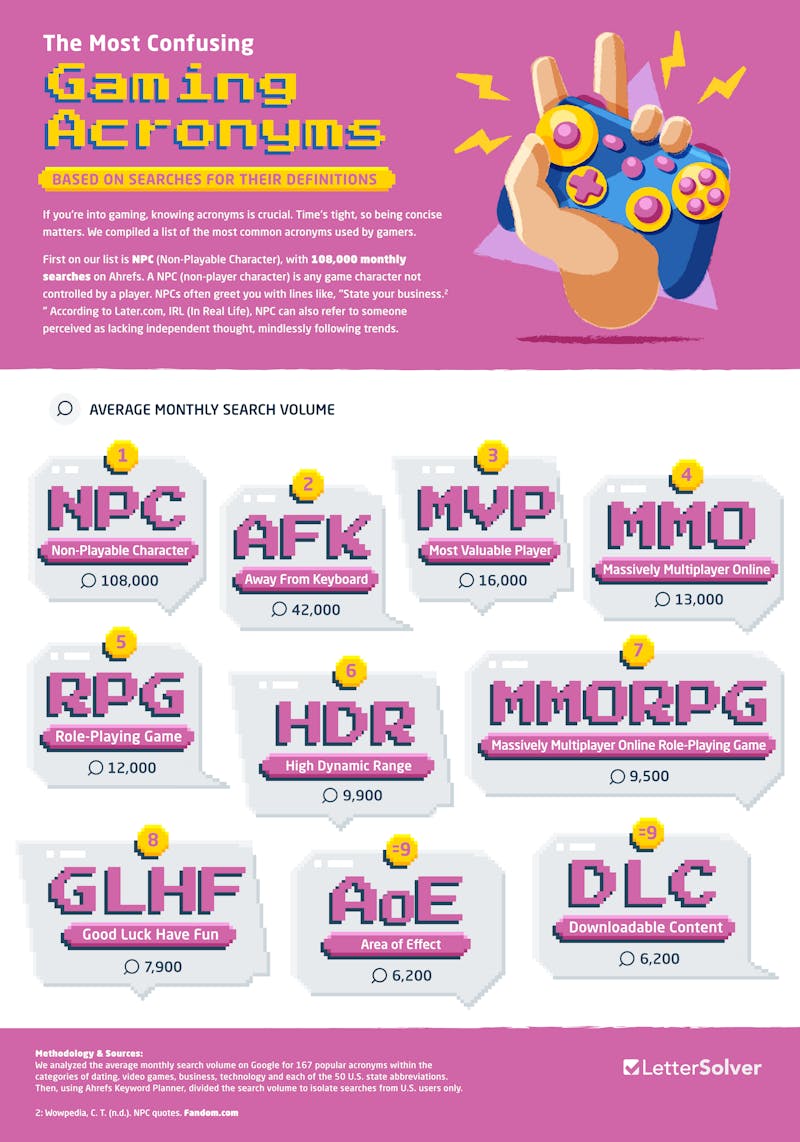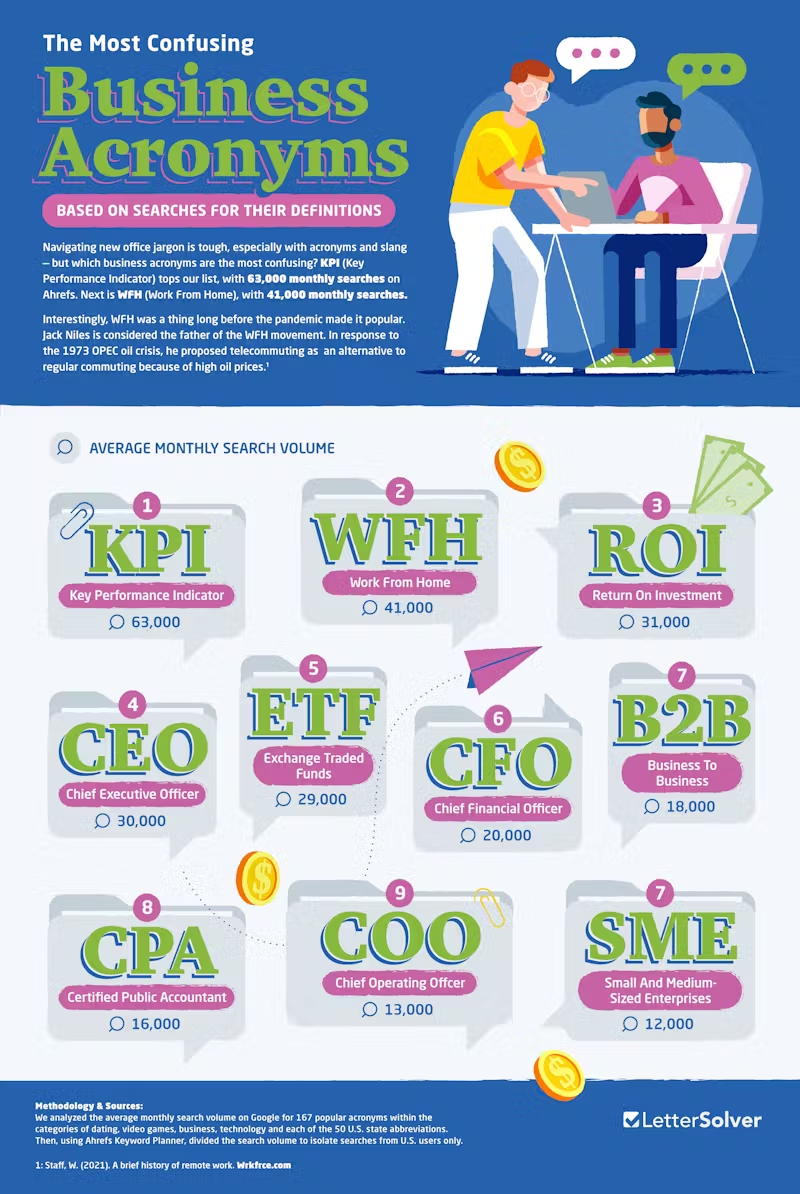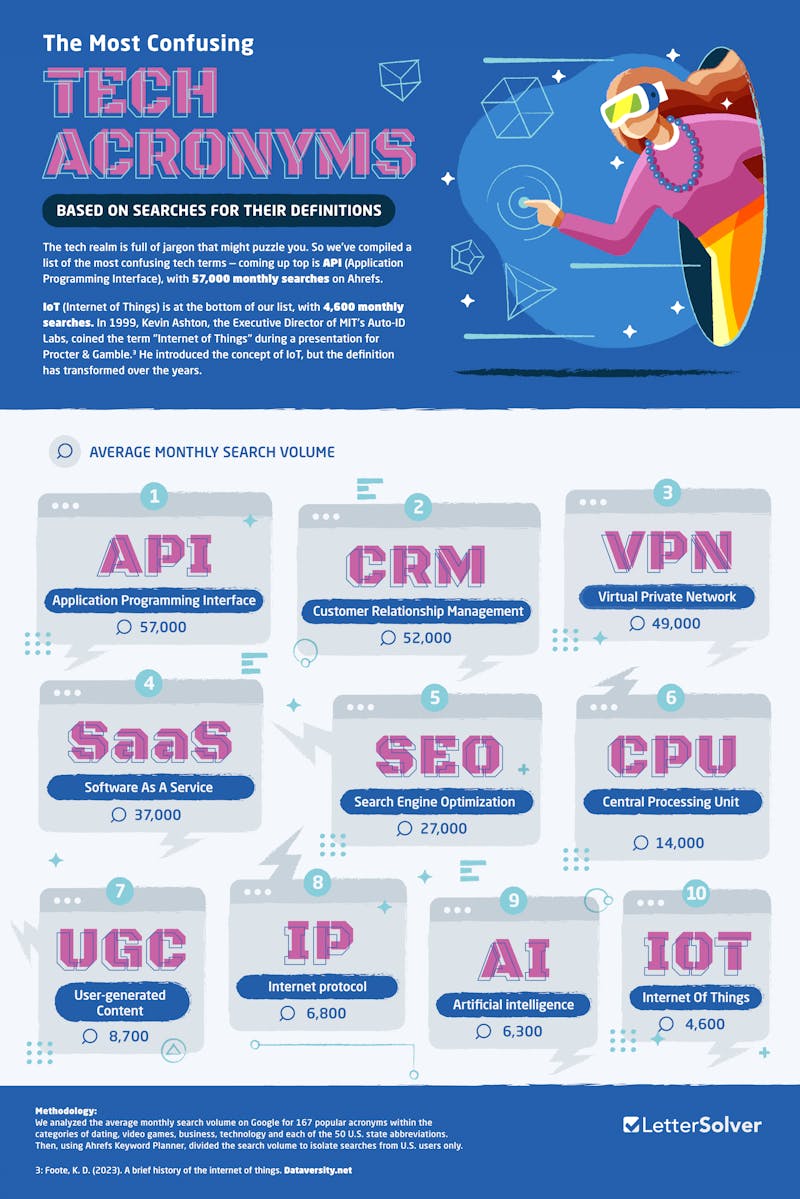The Most Confusing Acronyms and Abbreviations, Based on Searches for Their Definitions
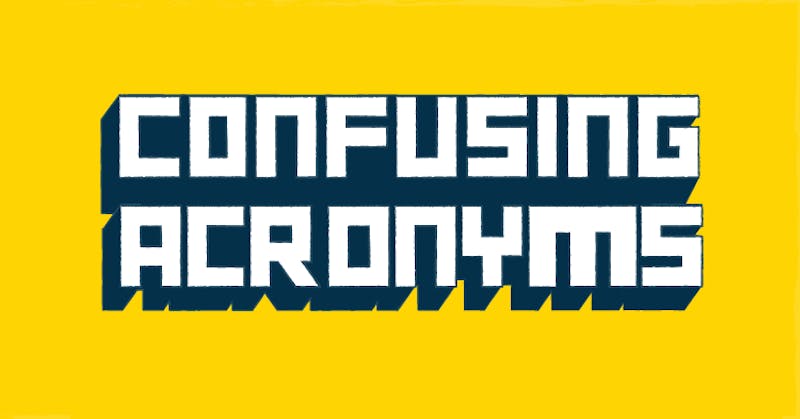
ABC may be as easy as 123 — and, for that matter, do re mi — but when folks start jumbling those and all the other letters together out of sequence, things begin to get tougher.
An acronym is an abbreviation of a word sequence into a short group of letters, usually the initials of the words in the phrase being abbreviated. Technically, the abbreviation should form a new ‘word’ — LOL or POTUS, for example — to be considered an acronym, and acronyms are a subcategory of initialism, a broader term that includes non-wordy abbreviations, such as CIA and BDSM. But in general use (and for our purposes below), ‘acronym’ tends to be used for any collection of letters of this sort.
Acronyms are supposed to make things quick and easy. But when they do so for the writer at the expense of the reader, the net result is negative. Using acronyms such as KPI (Key Performance Indicator) or SaaS (Software As A Service) without ‘breaking them out’ into their constituent words on first use can be confusing or alienating for readers, regardless of reading levels.
A further grumble about acronyms is that they are (generally) not acceptable in Scrabble. FFS! So, Letter Solver has decided to get our own back by revealing the acronyms and state name abbreviations that Americans find most confusing — judged by how often they search for their meaning on Google.
We did this by analyzing the monthly Google search volume for 167 popular acronyms across the categories of dating, video games, business, technology, and each of the 50 U.S. state abbreviations.
Key Findings
- FWB (Friends With Benefits) is the most confusing dating acronym, with 101,000 Americans searching for its meaning every month.
- KPI (Key Performance Indicator) is the most confusing business acronym (63,000 monthly searches).
- NPC (Non-Playable Character) is the most confusing gaming acronym (108,000 monthly searches).
- API (Application Programming Interface) is the most confusing tech acronym (57,000 monthly searches).
- ME (Maine) is the most confusing state abbreviation, with 23,000 monthly searches.
The dating scene became supercharged when the world went online: first via bulletin boards and newsgroups; next, dedicated sites such as Match.com; and then, portable totty radar systems (uh, geosocial networking applications), such as Tinder. With so much love to be found, singles don’t have the time or the character count to spell everything out. Rather than get into something unexpected, profile browsers must check what terms such as FWB (Friends With Benefits) and DTF (Down to ‘Frolic’) mean. Not that there’s anything wrong with wanting to frolic.
Gaming communities are not famed for being the most welcoming, even before you consider their prodigious use of acronyms. But we can cut gamers some slack since their thumbs are generally far too busy to spell out phrases such as Massively Multiplayer Online Role-Playing Game (MMORPG) or Non-Playable Character (NPC) in the chat. The latter is the most Googled by a considerable margin by virtue of crossing over into civilian use via 4chan, Reddit and TikTok, beginning in 2018, when it was redefined to indicate a human who has repeats the opinions of others by rote or who is otherwise lacking in personal agency.
Business people may have a little more free time to spare than gamers, but they still love an acronym since they believe it makes them seem knowledgeable and important. But for those who don’t know an ETF from a WTF and plan to make a killing in the market — or make it through an episode of Succession without giving up on the plot — these terms require Googling. Not that knowing that ETF stands for Exchange Traded Funds necessarily makes it all clear. KPI (Key Performance Indicator) is the most searched: a KPI is any metric used for assessing achievements or progress. At 63,000 monthly searches, KPI has an impressive KPI for “being a confusing acronym.”
As an industry, tech is always developing new systems and concepts, many of which involve a vocabulary that is hardly sexy enough to warrant overuse. Take a look at the top two acronyms: Application Programming Interface and Customer Relationship Management. Do you ever want to hear any of those words again? As the AI (Artificial Intelligence) revolution demonstrates, sometimes it’s enough to know that Chat GPT works without understanding what LLM and GAN mean — unlike AI, neither of these AI-themed acronyms make the top ten most searched, although maybe they will as AI goes mainstream.
The State Abbreviations That Americans Need to Search on Google
State abbreviations have grown both bigger and smaller over time: Ohio’s used to be “O,” while Alaska was known, in ‘short,’ as “Alaska” until 1963 — four years after it had graduated from being a territory to becoming a state. Like many states, Alaska’s abbreviation changed twice in 1963 as the U.S. Postal Service (USPS) sought to standardize postal abbreviations. The USPS finally settled on the two-letter codes we now know since addressing machines at the time had a limited character count. Unfortunately, the two-letter system is far from intuitive for many states, leading Americans to Google “What state is [XX]” over 150,000 times a month. Here’s the breakdown of how many of those searches are for each state:
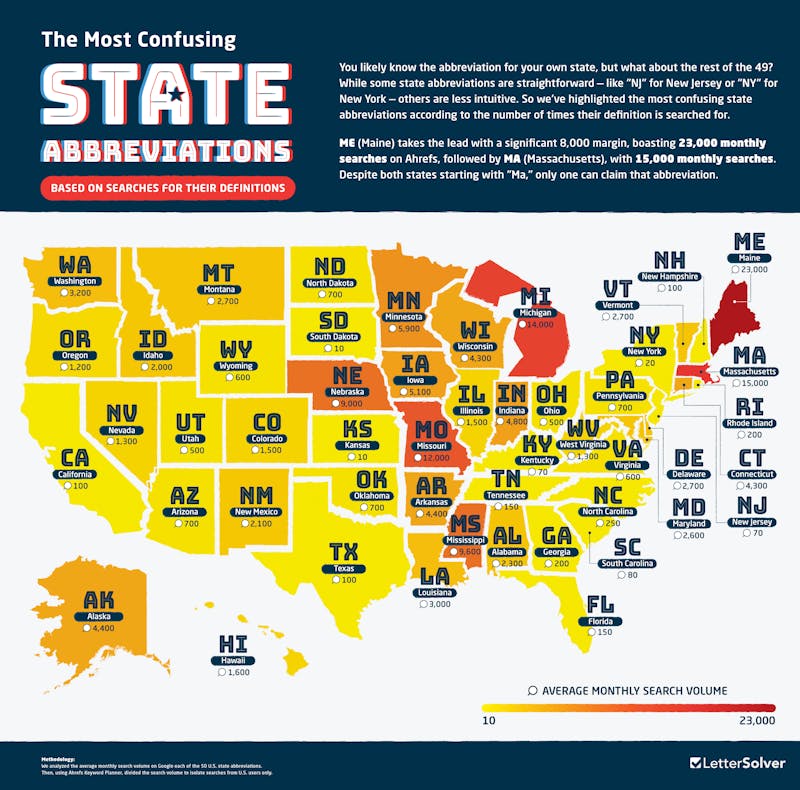
The Ms have it: Maine, Massachusetts, Michigan, Missouri and Mississippi are the five most searched state abbreviations, accounting for nearly half (73,600 or 47.77%) of all searches. Maine was actually known, in ‘short,’ as “Maine” for a couple of decades, while the others were known by four-letter abbreviations for nearly 90 years before the USPS snipped the ZIPs.
Maryland has always been MD or Md., and that seems to work fine.
World Wide What?
The internet age has shifted a lot of previously verbal communication into textual form, changing the way we use abbreviations. On the one hand, they’ve grown more prevalent as writers, and everyday users have sought to save time, character count and thumb wear by shortening familiar terms to their initialisms. However, a written text cannot adapt itself to the reader or answer questions in the same way a teacher or post office employee can.
Neither are today’s acronyms necessarily the most efficient way to pronounce a phrase out loud. Just look at WWW, which takes longer to say (although not to write) than World Wide Web. “Friends at CERN gave me a hard time, saying it would never take off, especially since it yielded an acronym that was nine syllables long when spoken,” said its inventor, Tim Berners-Lee. Still, WWW is a bit more democratic than another idea he had for naming the web: “The Information Mine,” or TIM.
Talking of the wide world, you can sort our data in full, with the addition of acronym search data for Canada, Australia, the UK and South Africa in the interactive table below.
METHODOLOGY
For this research, we analyzed the average monthly search volume on Google for 167 popular acronyms within the categories of dating, video games, business, technology and each of the 50 U.S. state abbreviations.
Using Ahrefs Keyword Planner, we collected the search volume for users in the U.S., Canada, Australia and the UK and divided the results per country.
Search volume for U.S. State abbreviations, using the logic “What state is [x]” was limited to users in the United States. Searches for definitions of acronyms in each country followed the logic: “[acronym] meaning.”
To ensure acronym definitions in our final rankings were not ambiguous, we manually checked the definitions provided by the top search results on Google for each acronym when searching as a user in each country and removed any ambiguous examples accordingly.
The data analysis is correct as of September 2023.
ADDITIONAL SOURCES
1: Staff, W. (2021). A brief history of remote work. wrkfrce.com
2: Wowpedia, C. T. (n.d.). NPC quotes. fandom.com
3: Foote, K. D. (2023). A brief history of the internet of things. dataversity.net
4: Wiles, K. (2013). The History of Abbreviation.thehistoryvault.co.uk
